Отзывы о пройденной практике
Отзыв по итогам практики Веры Сон, пройденной летом 2025 г. в Институте общей генетики им. Н.И. Вавилова РАН
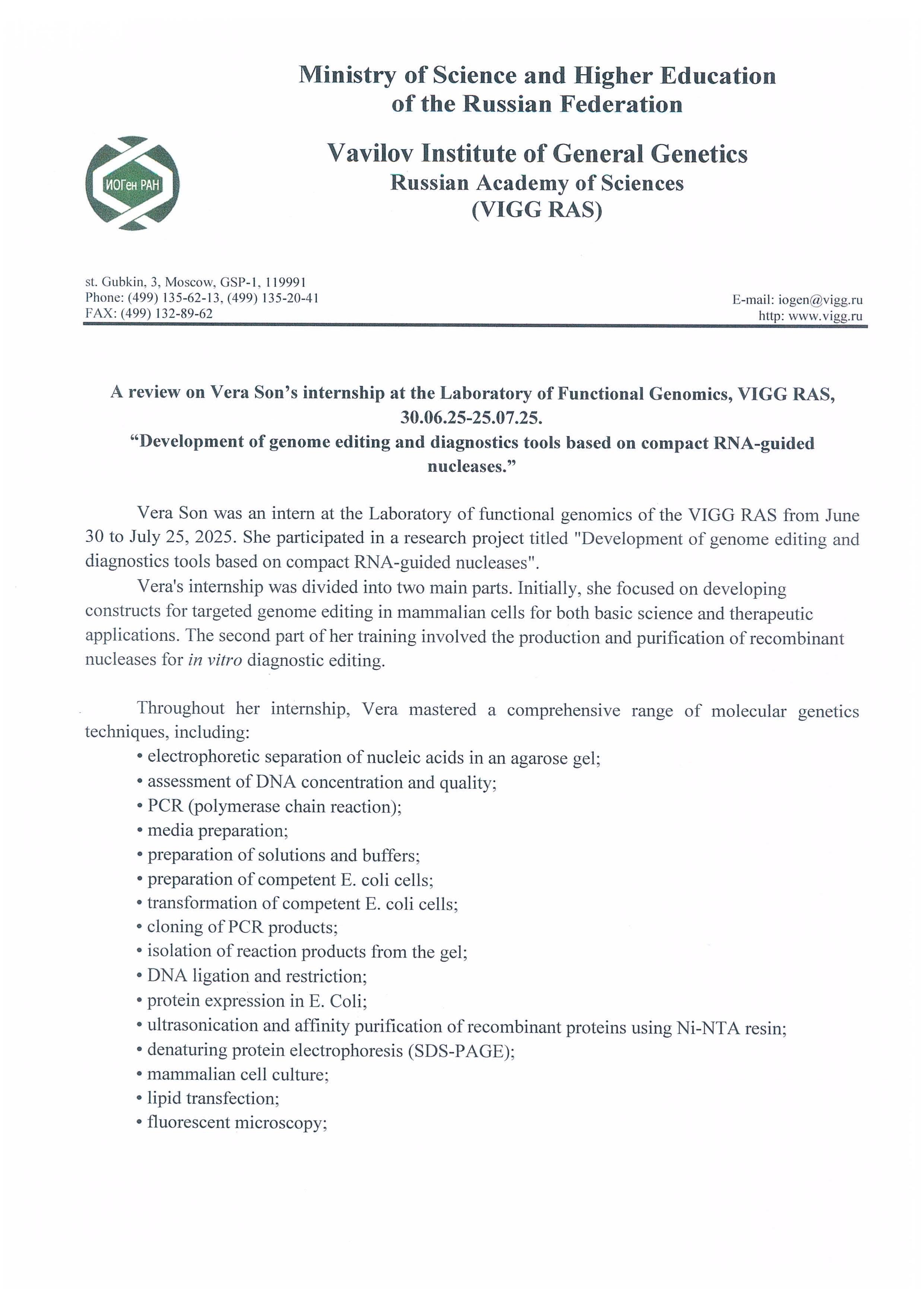
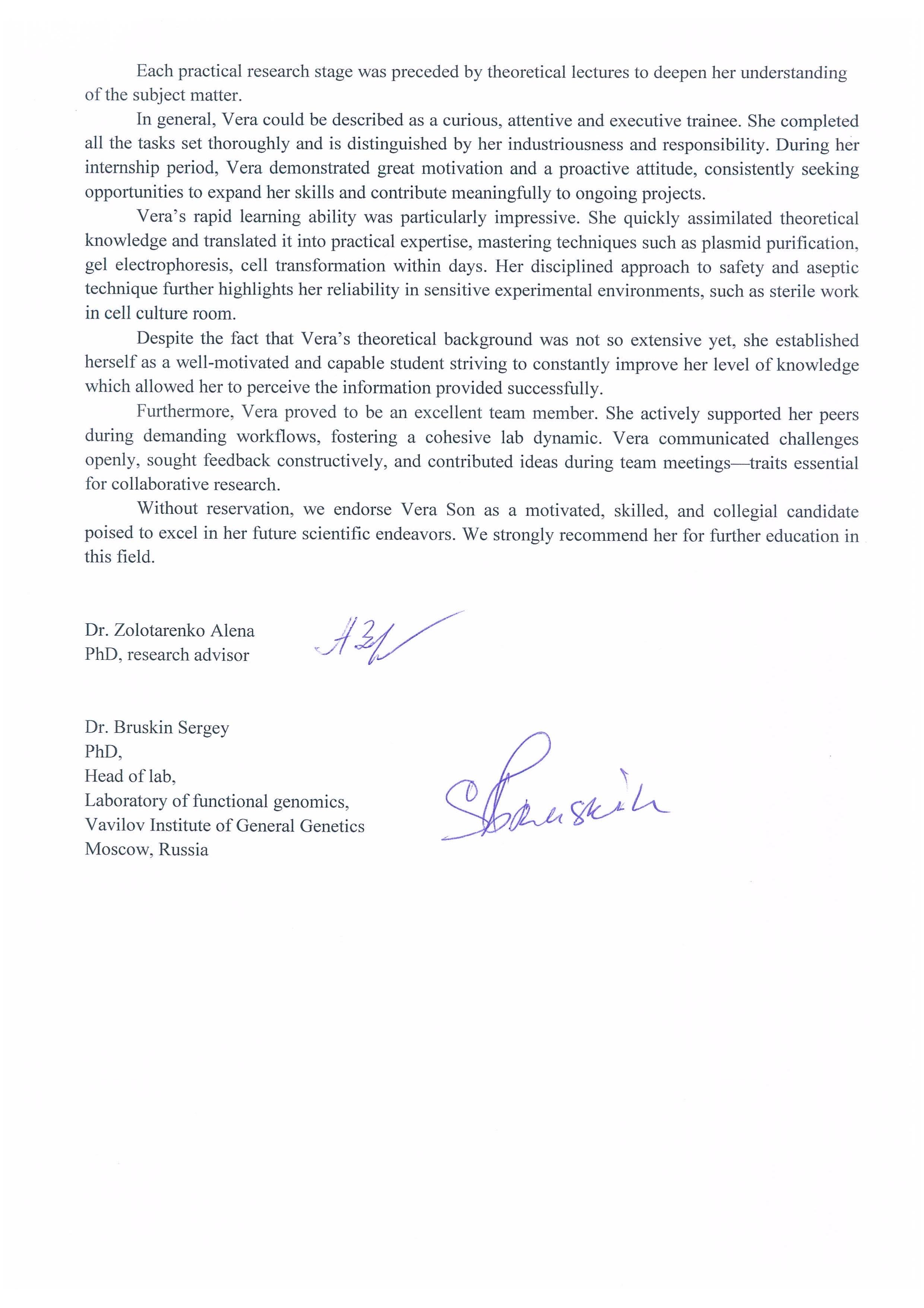
Отзыв по итогам практики Екатерины Хватовой, пройденной летом 2022 г. в Институте общей генетики им. Н.И. Вавилова РАН
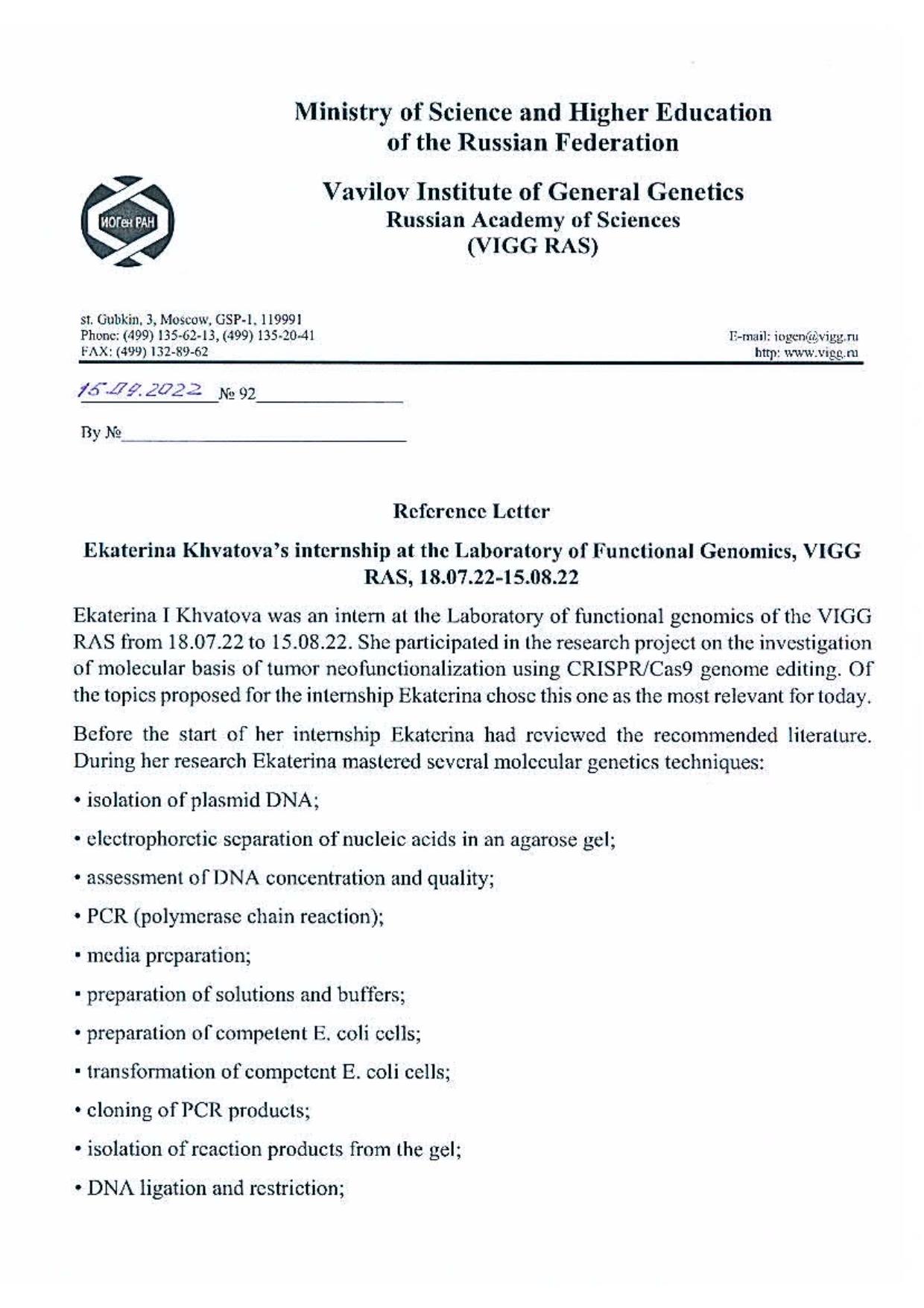
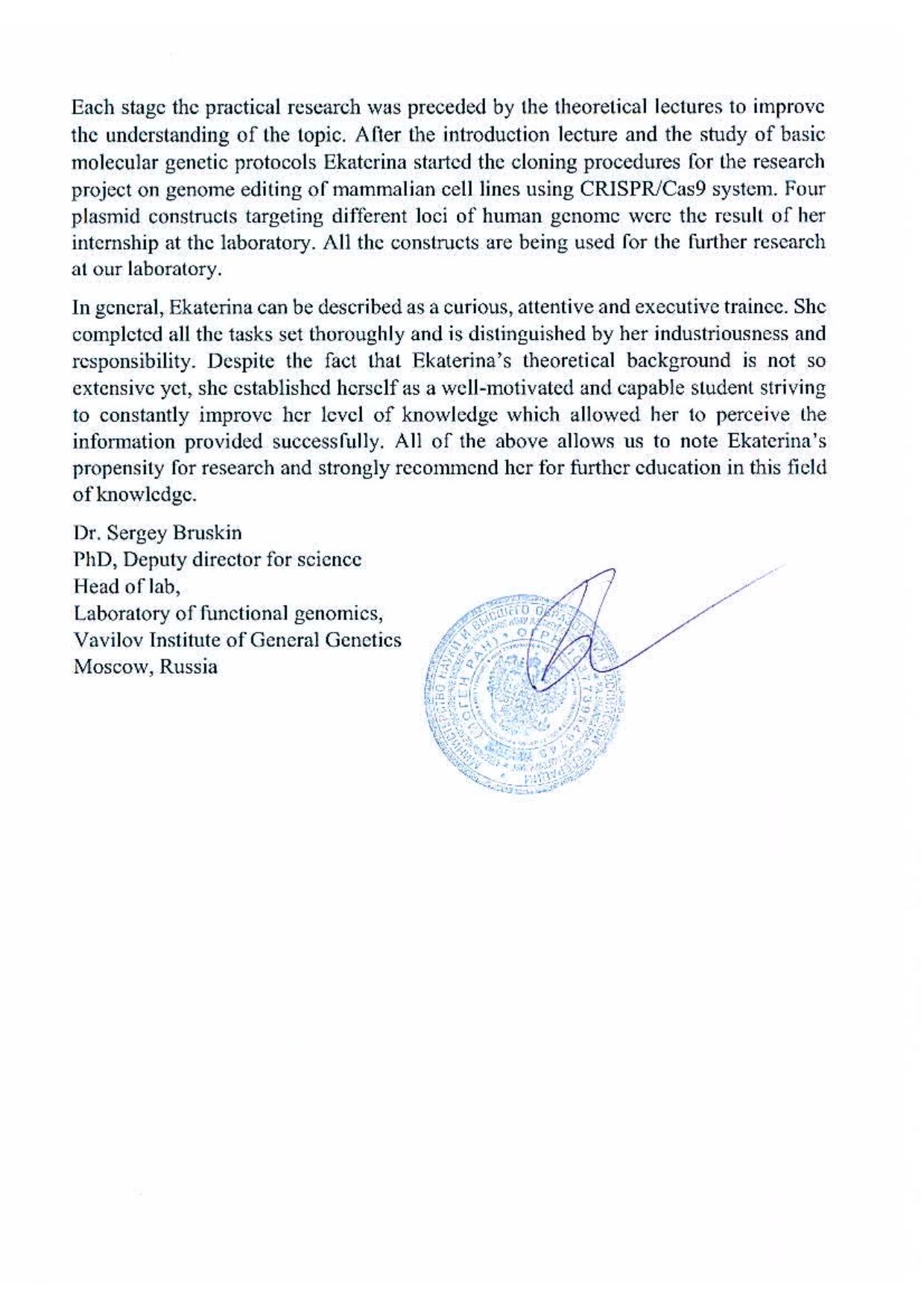
Отзыв по итогам практики Екатерины Хватовой, пройденной летом 2020 г. в Институте общей генетики им. Н.И. Вавилова РАН
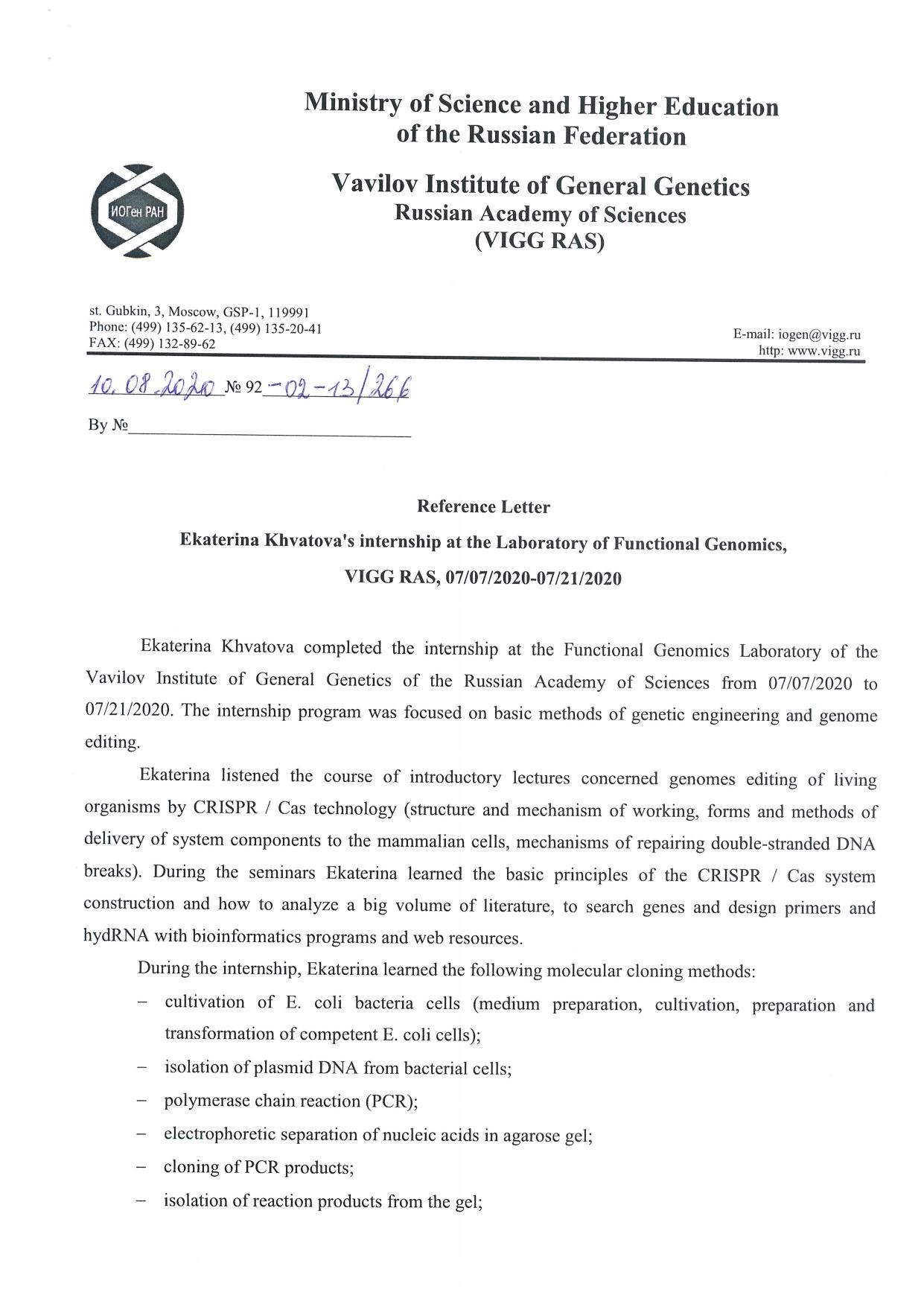
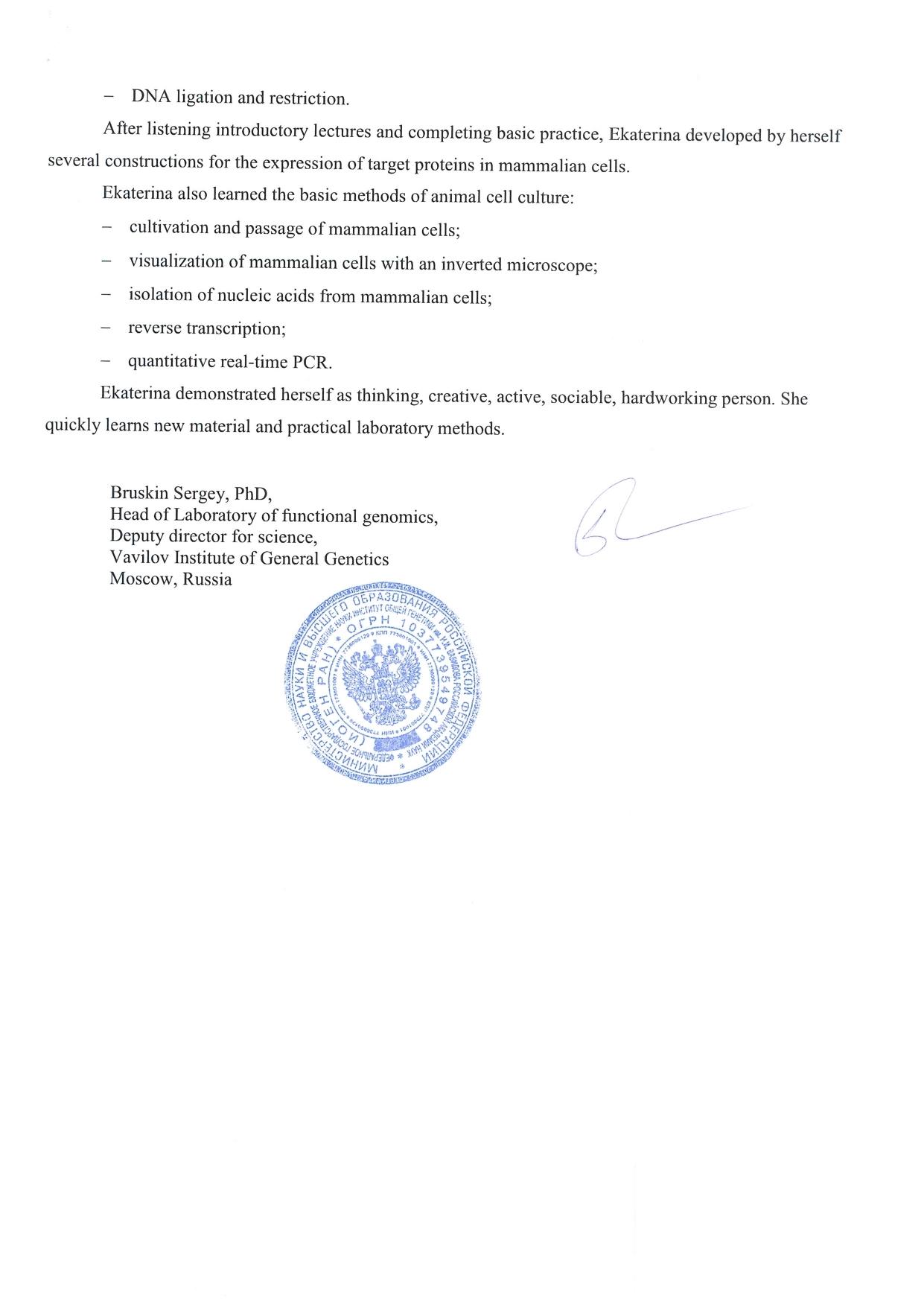
Отзыв по итогам практики Ксении Фёдоровой, пройденной летом 2020 г. в Институте общей генетики им. Н.И. Вавилова РАН
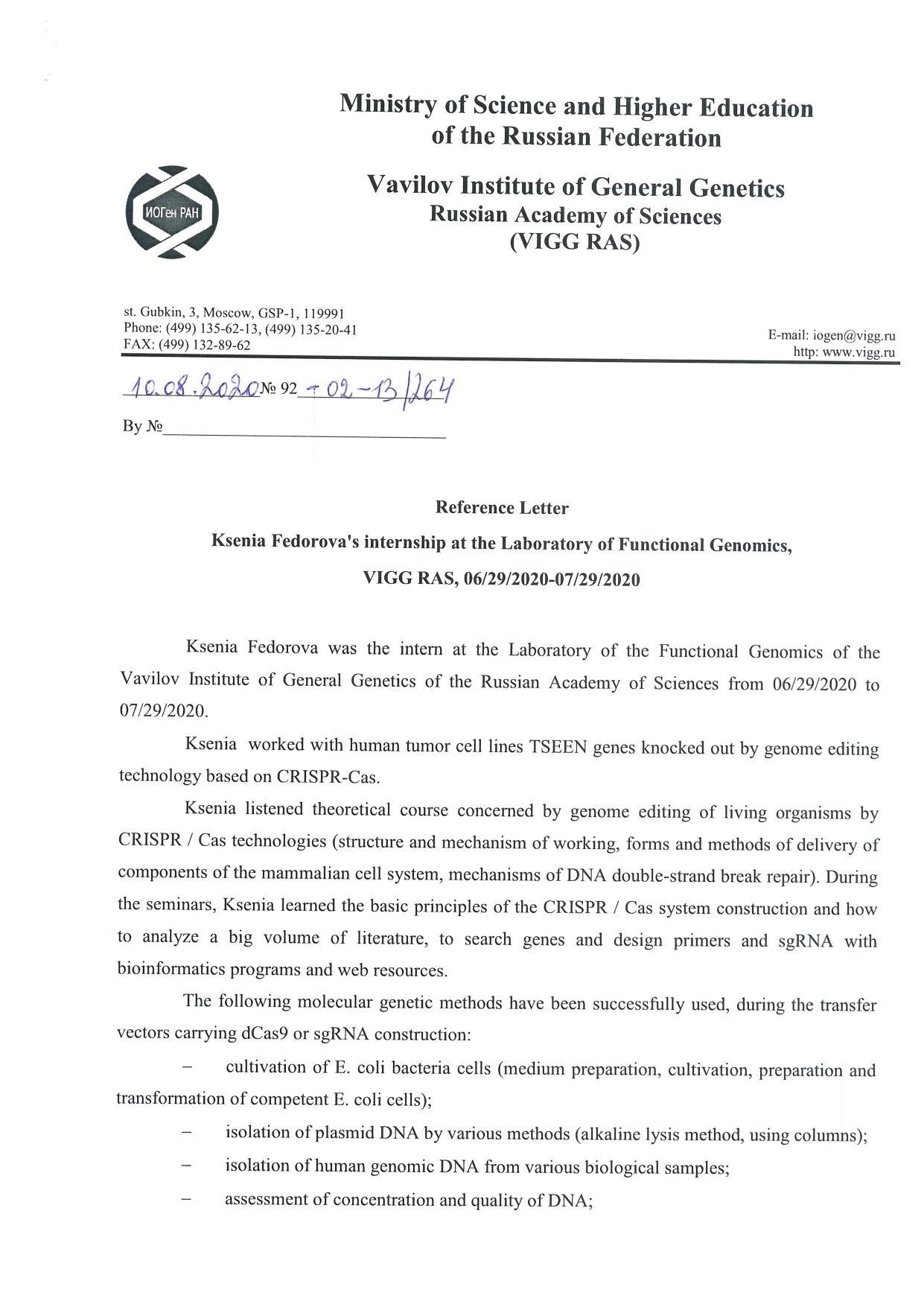
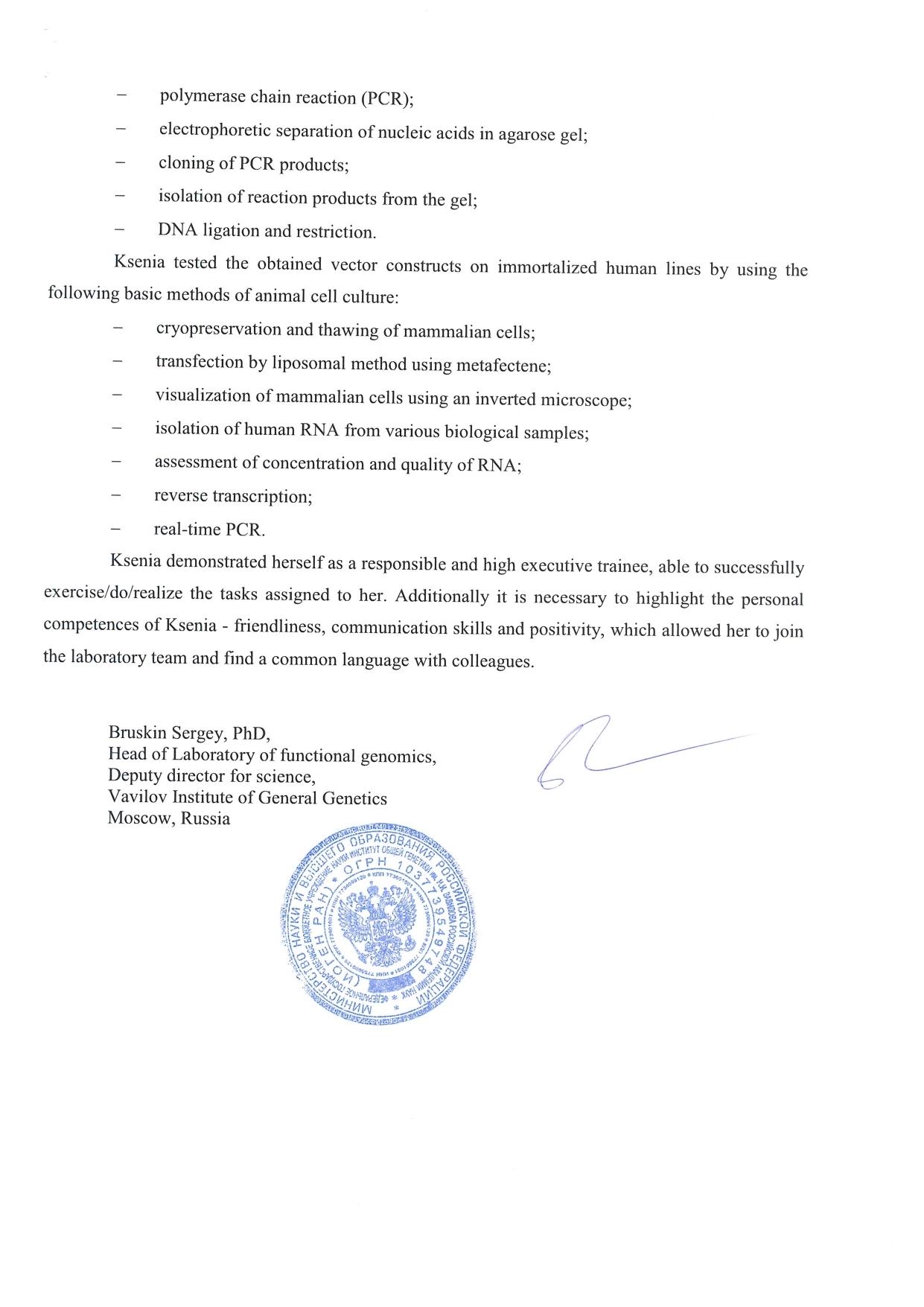
Отзыв по итогам практики Михаила Ванина, пройденной летом 2021 г. в компании "Сервисный центр Транстелематика"
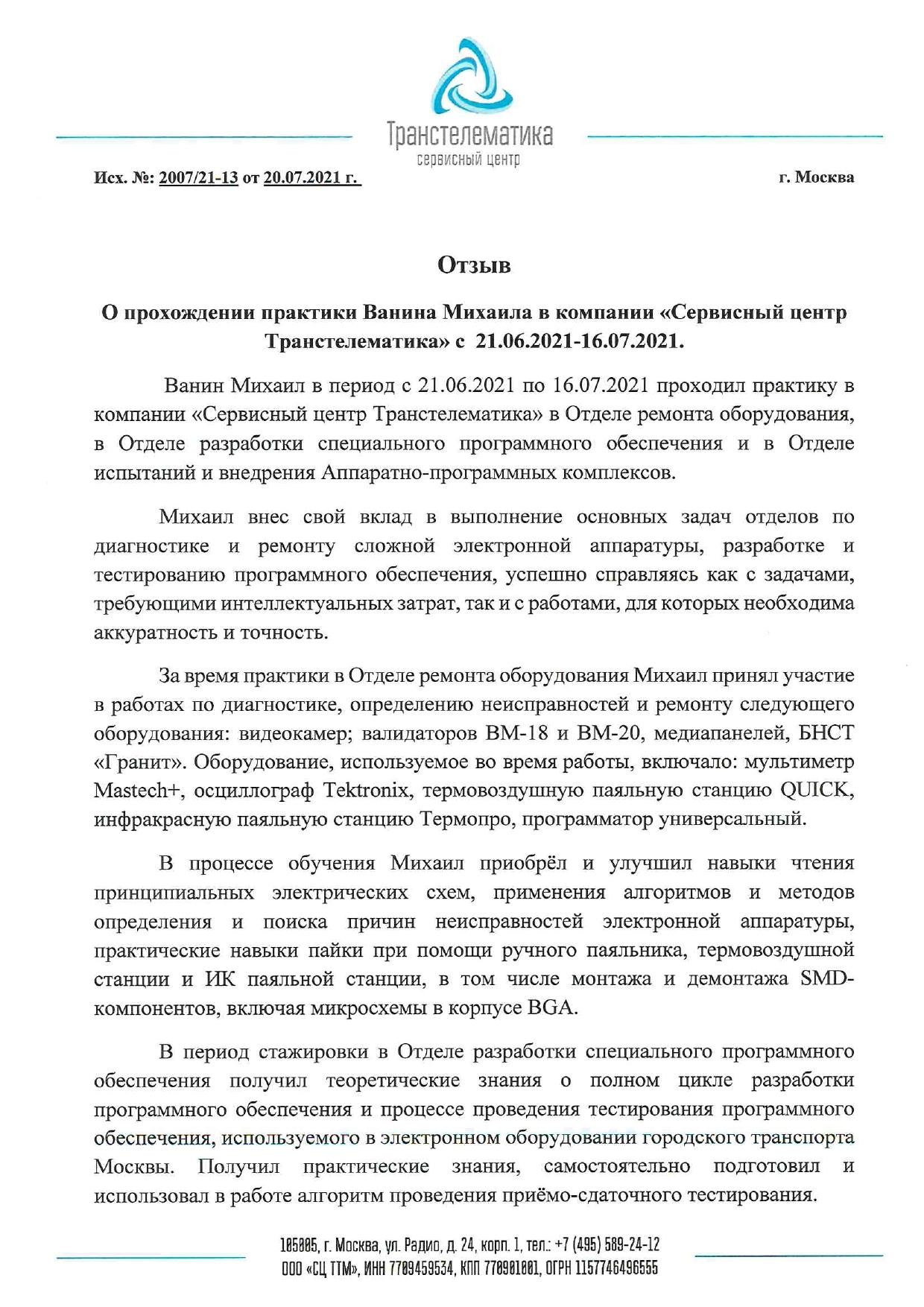
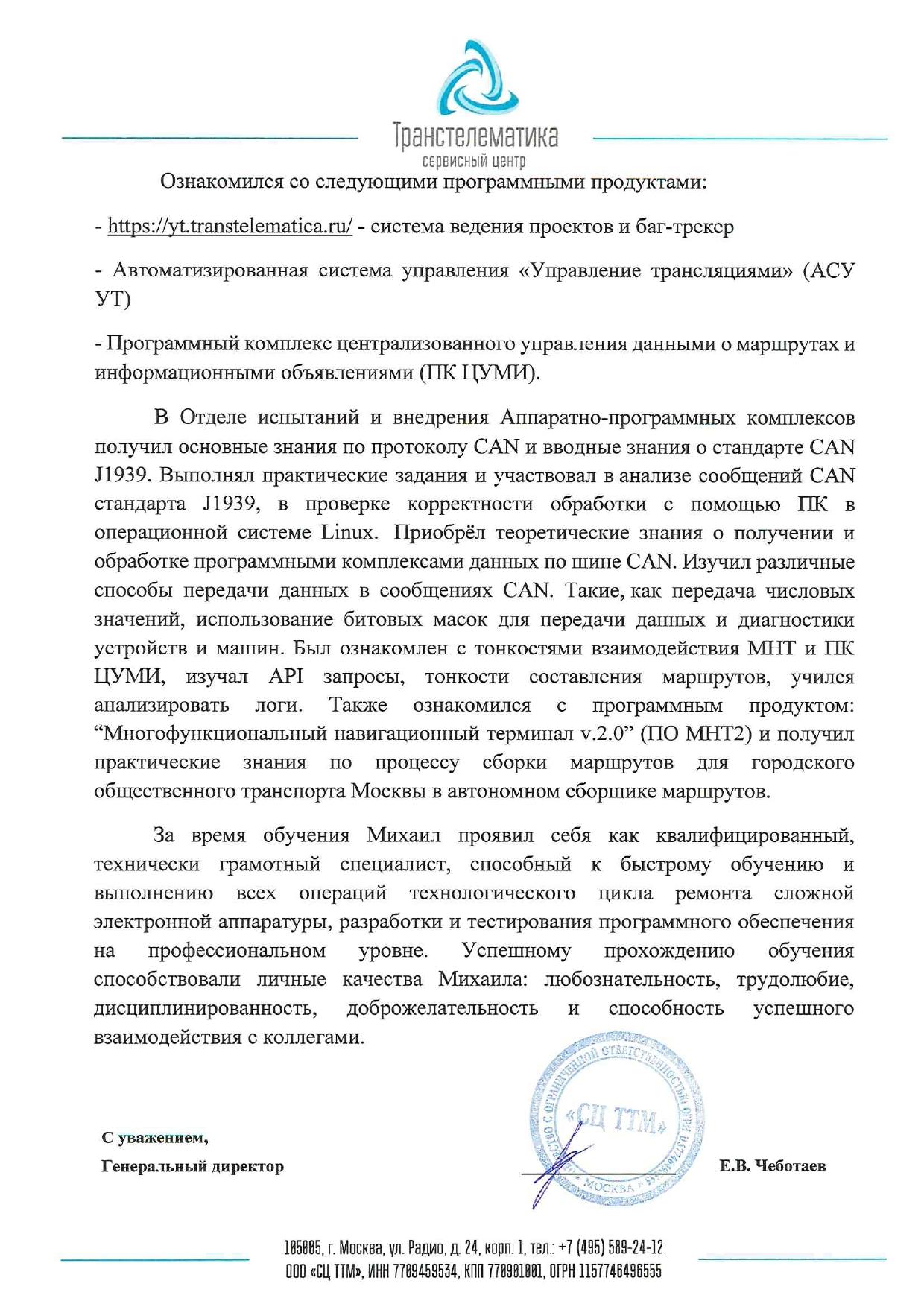
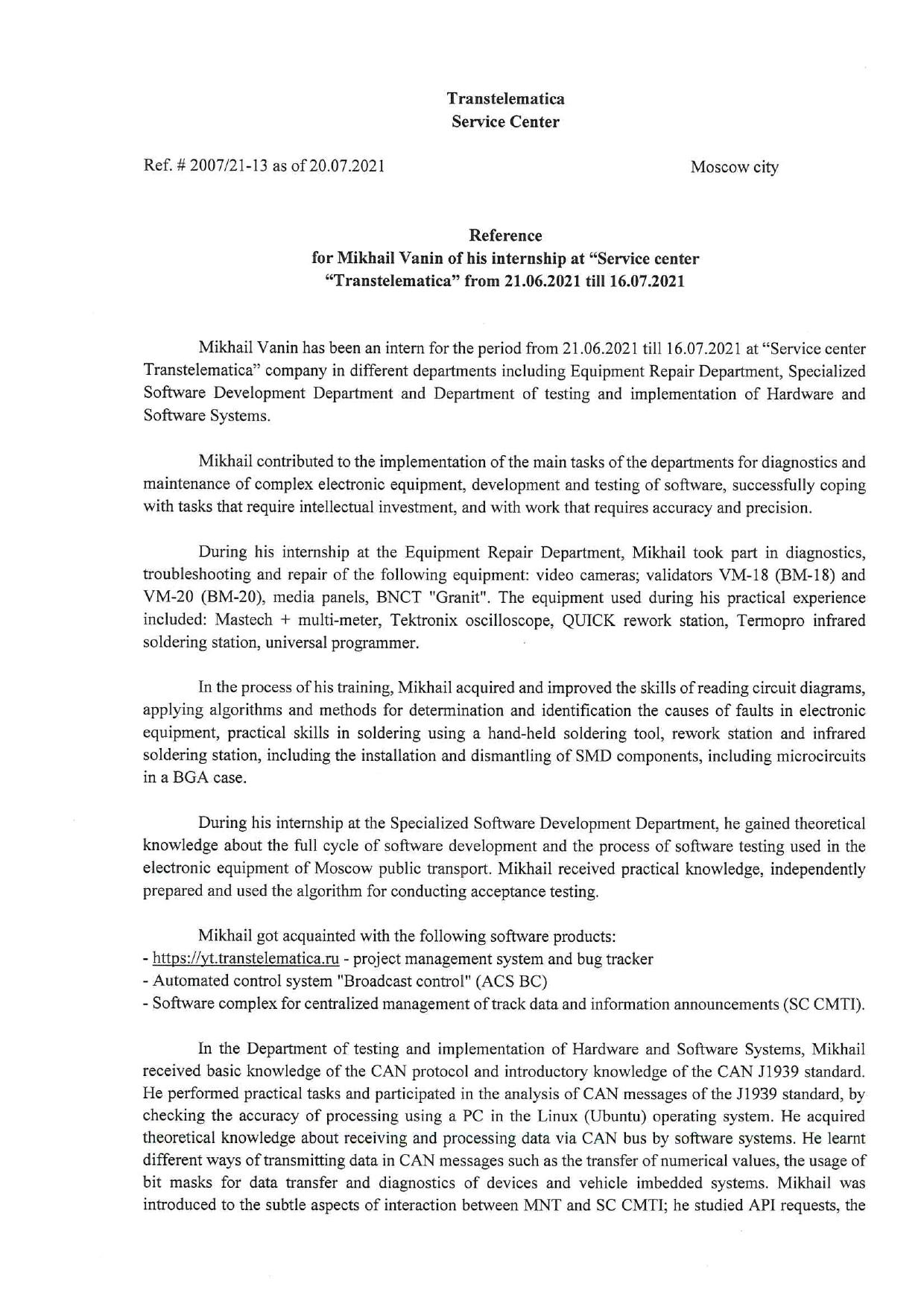
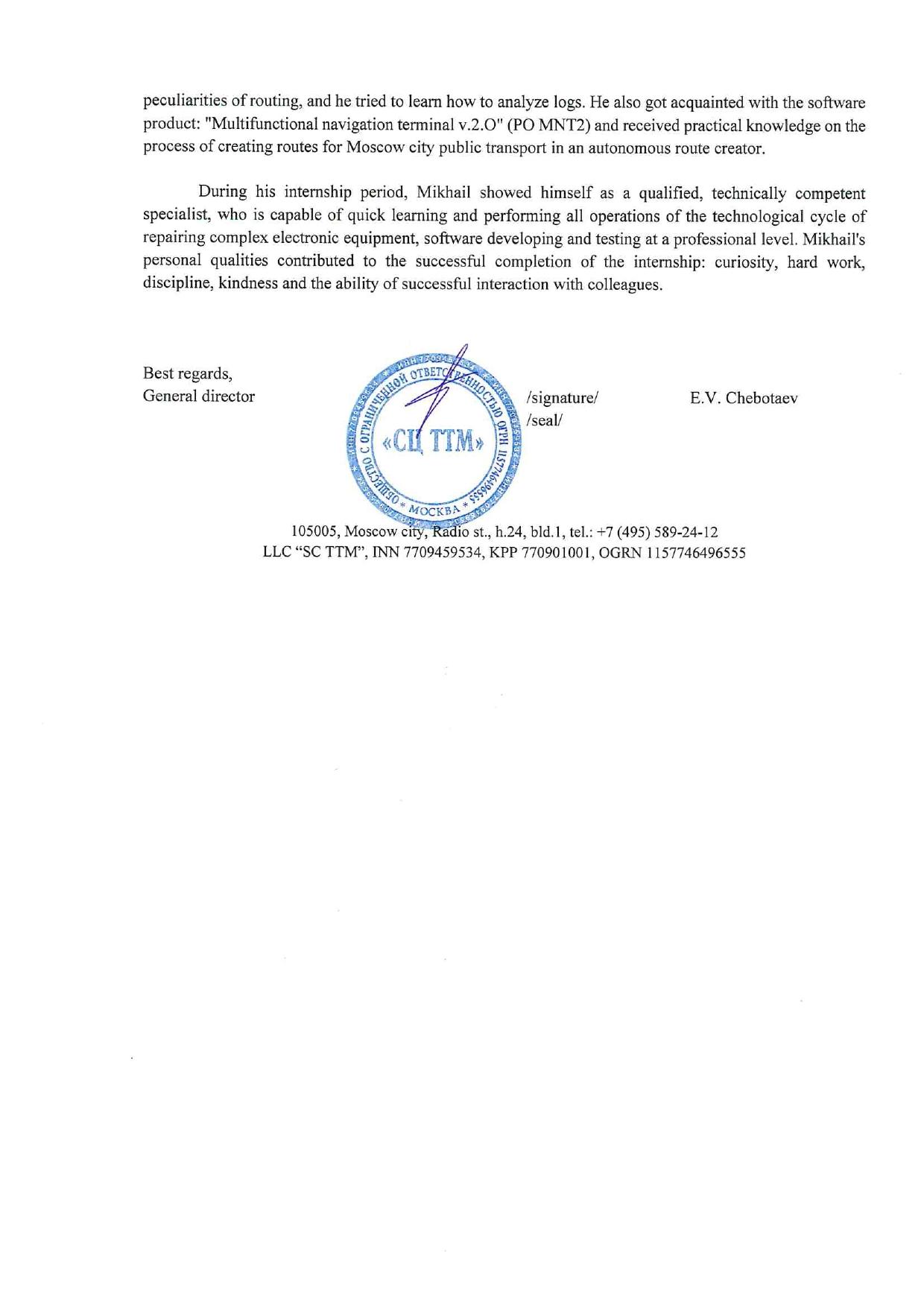
Отзыв по итогам практики Максима М., пройденной летом 2021 г. в НИВЦ МГУ
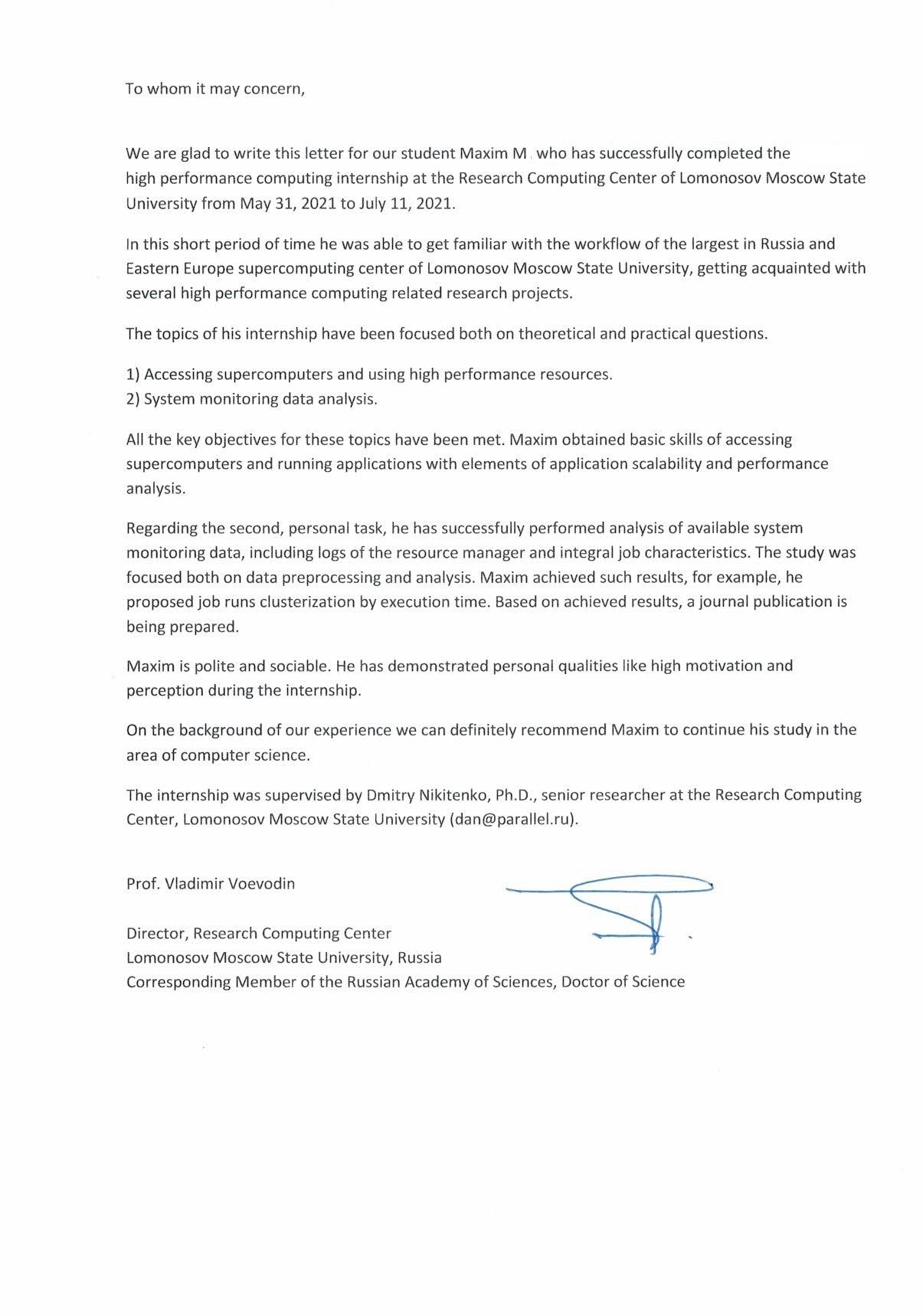
Отзыв по итогам практики Ольги Красненковой, пройденной летом 2020 г. в Harvard Kennedy School
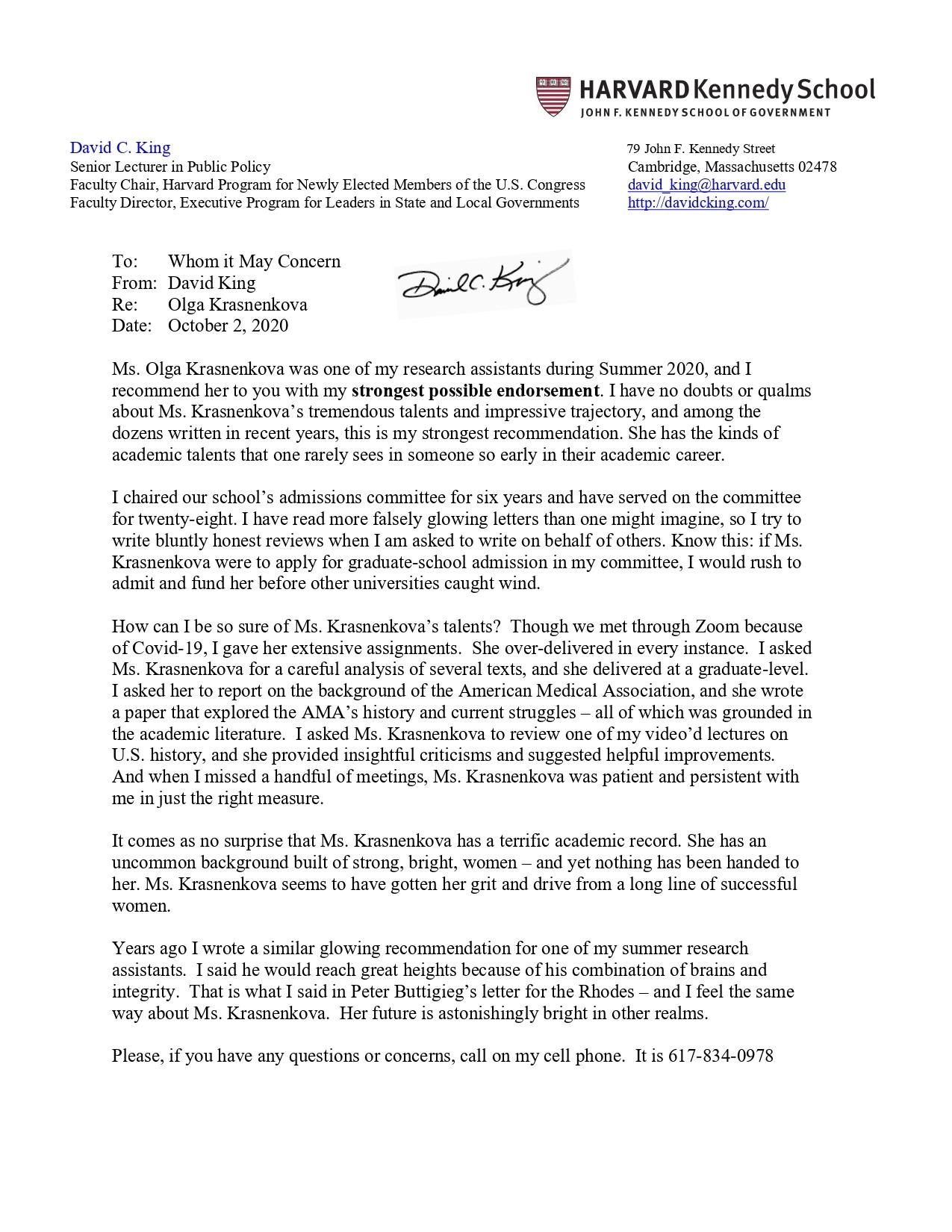
Отзыв по итогам практики Анны В., пройденной летом 2020 г. в Институте общей генетики им. Н.И. Вавилова РАН
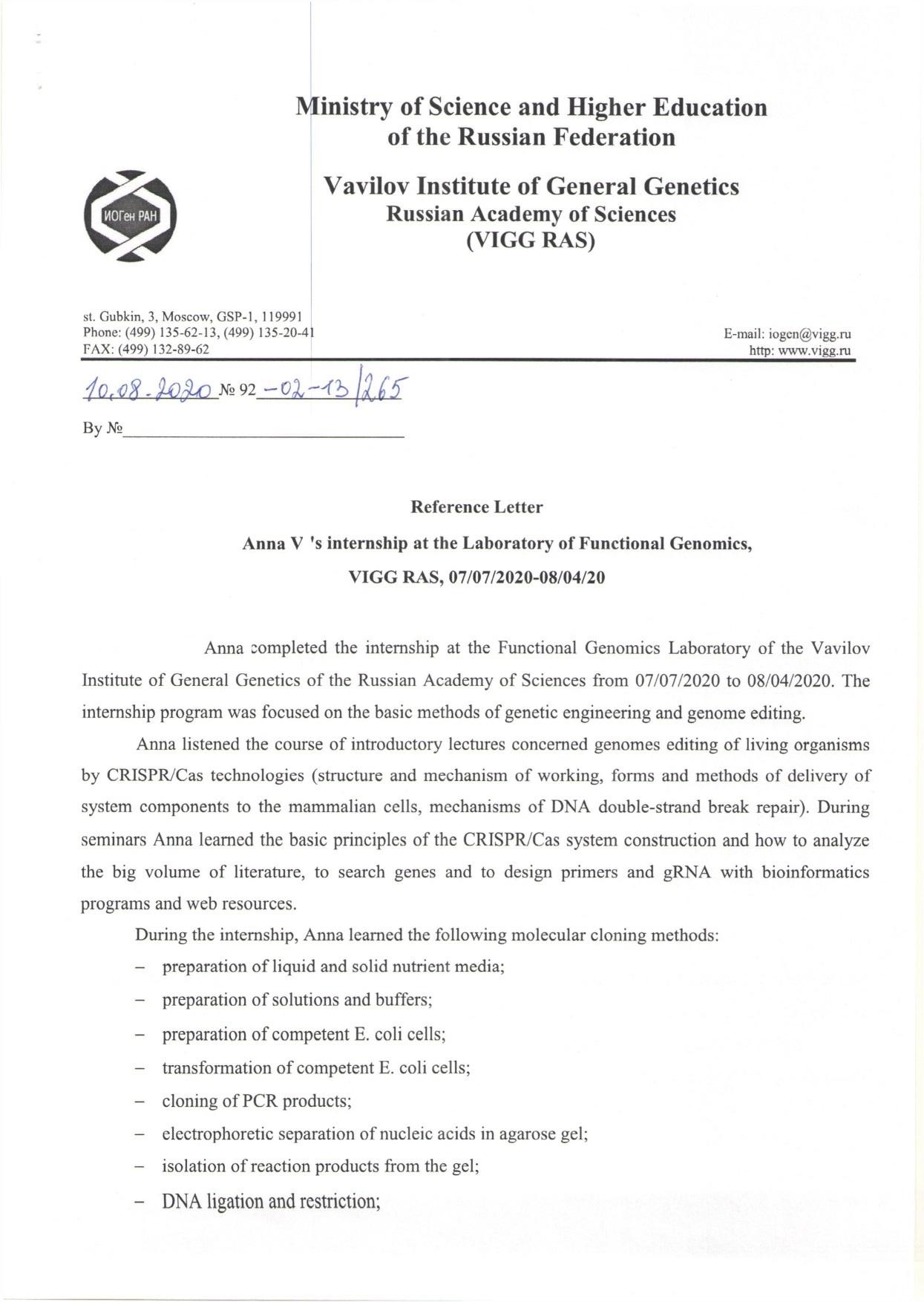
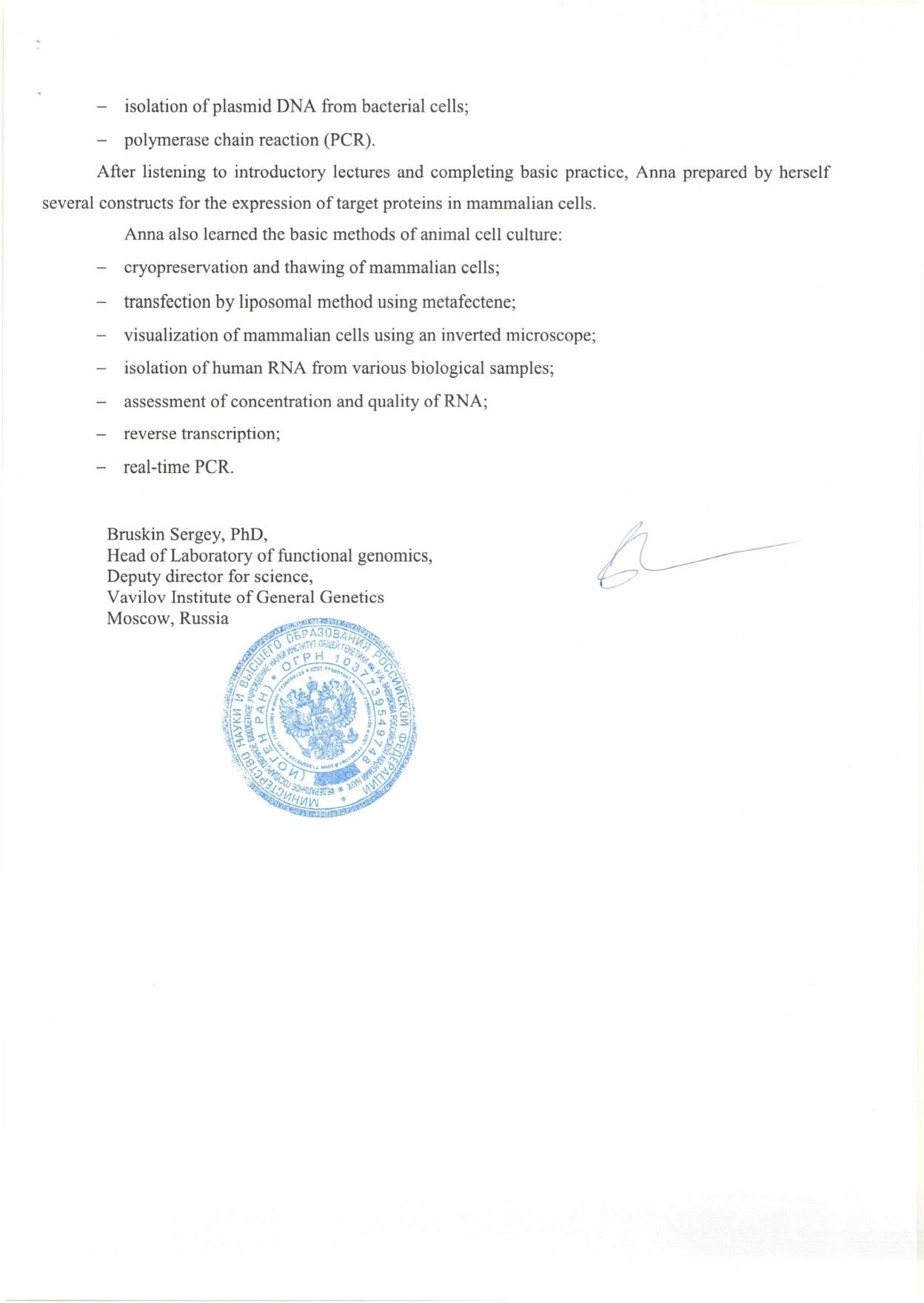
Отзыв по итогам практики Михаила В., пройденной летом 2020 г. в НИВЦ МГУ им. М.В. Ломоносова
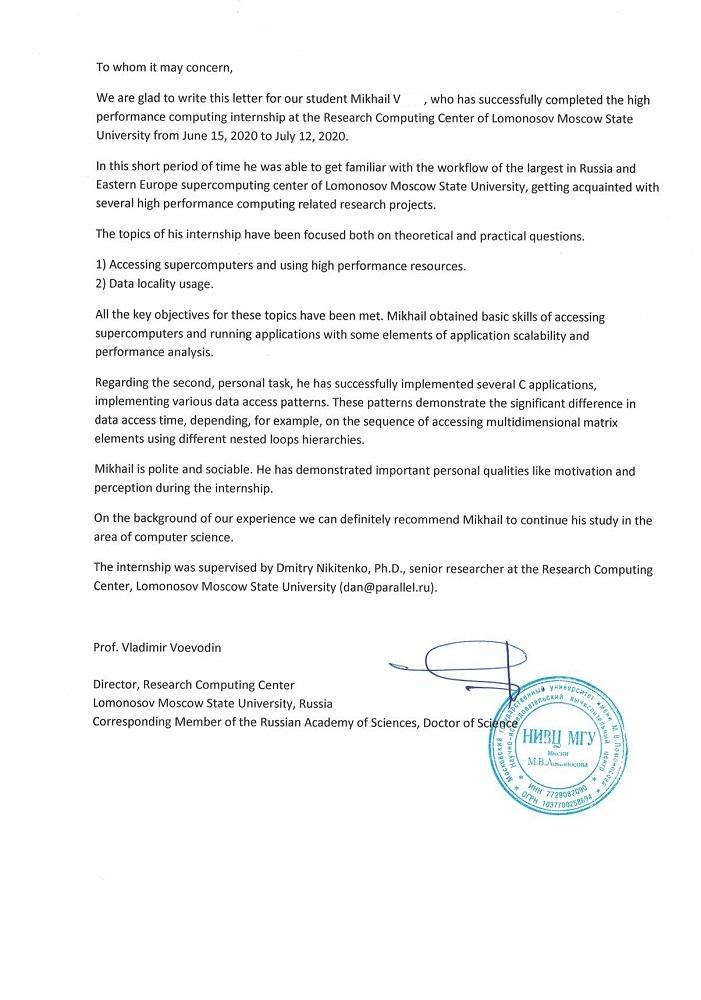
Отзыв о практике, пройденной летом 2018 г. в Институте общей генетики им. Н.И. Вавилова РАН, написан студенткой King's College London Анной Леоновой
Одним словом - замечательно. Все были очень приветливы; если у меня возникали трудности, то мне всегда готовы были помочь и дать нужное объяснение.
По большей части, я работала с бактериальной ДНК. В первые дни я изучила подготовку среды для роста бактерий, выращивание ночной культуры, рассев бактерий в чашку Петри, приготовление компетентных клеток.
После этих базовых техник, мы перешли к клонированию. Для этого, в клетки E.coli мы лигировали плазмидный вектор. С помощью техники ПЦР, меня научили нарабатывать данный продукт, проводить электрофорез (для обнаружения) и выделять нужный продукт из геля. Потом, мы проводили трансформацию бактериальных клеток для выращивания новых клеток, которые бы содержали плазмидную вставку. Заключительным этапом была рестрикция (грубо говоря - вырезка нужной части из бактериальной ДНК).
Из ночной бактериальной культуры меня научили выделять плазмидную ДНК. Одним из самых интересных моментов практики была работа с человеческими клетками; этим я занималась уже ближе к концу, когда уже уверенно чувствовала себя в лаборатории. Меня научили делать имуноцитохимию (визуализация и локализация антигенов с помощью антител), и это было крайне увлекательно, несмотря на сложный процесс.
Мне также удалось наблюдать за процессом проведения Вестерн-блоттинга (идентификация белков с помощью специфических антител).
Я осталась очень довольна практикой: мне было очень приятно получить новые знания и бесценный опыт. Но самое главное - я была очень рада, хоть и не надолго, быть частью такого замечательного и доброжелательного коллектива! Очень жаль, что практика пролетела так быстро.
Отзыв по практике Ксении Федоровой в Лаборатории функциональной геномики ИОГен РАН, 15.07.19-15.08.19
«Поиск потенциально информативных эпигенетических маркеров возраста и определение их статуса метилирования на образцах ДНК человека».
Практика Ксении Федоровой в Лаборатории функциональной геномики ИОГен РАН была посвящена выполнению работ в рамках проекта по поиску потенциально информативных эпигенетических маркеров возраста и определению их статуса метилирования на образцах ДНК человека. В ходе участия в данном проекте Ксения освоила следующие молекулярно-генетические методы:
• выделение геномной ДНК человека из различных типов биологических образцов;
• электрофоретическое разделение нуклеиновых кислот в агарозном геле;
• оценка концентрации и качества ДНК;
• бисульфитная конверсия ДНК;
• полимеразная цепная реакция;
• приготовление жидких и твердых питательных сред;
• приготовление растворов и буферов;
• приготовление компетентных клеток E.coli;
• трансформация компетентных клеток E.coli;
• клонирование ПЦР-продуктов;
• выделение продуктов реакции из геля;
• лигирование и рестрикция ДНК;
В каждом блоке работ практическим занятиям Ксении предшествовали теоретические лекции для улучшения понимания материала.
Помимо этого, благодаря внимательному отношению и трудолюбию Ксении, в свободное от основной тематики время она также смогла принять участие в работах по проекту, связанному с изучением внутриклеточных сигнальных каскадов, выполняемых на иммортализованных клеточных линиях человека, в ходе которых Ксения освоила базовые методы культуры животных клеток:
• культивирование и пассирование клеток млекопитающих;
• визуализация клеток млекопитающих при помощи инвертированного микроскопа;
• криоконсервация и размораживание клеток млекопитающих;
• выделение нуклеиновых кислот из клеток млекопитающих;
• обратная транскрипция;
• количественная ПЦР в реальном времени.
После прохождения вводных лекции и практикума по освоению базовых молекулярно-генетических протоколов Ксения приступила к работам по пробоподготовке в рамках проекта по поиску потенциально информативных эпигенетических маркеров возраста и определению их статуса метилирования на образцах ДНК человека. Ксения выделила геномную ДНК из 46 биологических образцов человека с последующим разделением и визуализацией в агарозном геле и флуориметрической оценкой концентрации. Затем она провела бисульфитную конверсию полученных образцов, и приняла участие в оптимизации условий бисульфитной ПЦР для увеличения выхода и чистоты целевых ампликонов. Обработанные Ксенией образцы стали частью выборки, которая в настоящий момент проходит анализ секвенированием по технологии Ampliseq.
Помимо анализа профилей метилирования ДНК при помощи масштабного секвенирования бисульфит-конвертированной ДНК, Ксения приняла участие в альтернативном типе анализа, предполагавшем индивидуальную амплификацию и клонирование целевых фрагментов в вектор с последующим секвенированием по Сэнгеру. Ксения провела оптимизацию условий ПЦР для амплификации целевого фрагмента гена ELOVL, затем на 6 матрицах конвертированной ДНК амплифицировала целевой фрагмент, клонировала в вектор, оттрансформировала бактерии E.coli и выделила по 5 клонов для каждой плазмидной ДНК. Полученная плазмидная ДНК отдана на секвенирование по Сэнгеру. Полученные Ксенией результаты будут рассматриваться при выборе оптимального подхода для оценки профилей метилирования целевых фрагментов.
В ходе работ по проекту по изучению внутриклеточных сигнальных каскадов Ксения приняла участие в постановке эксперимента по влиянию выбранных цитокинов на физиологию клетки, затем выделила РНК из 6 образцов обработанных клеток, визуализировала ее на геле, провела флуориметрическую оценку концентрации, поучаствовала в получении кДНК методом обратной транскрипции и в оценке экспрессии целевых генов методом количественной ПЦР в реальном времени. Полученные Ксенией результаты использованы для оптимизации протокола индукции цитокинами.
Reference Letter about Ksenia Fedorova's internship at the Laboratory of Functional Genomics, VIGG RAS, 15.07.19-15.08.19, “Identification of the informative epigenetic age markers and determination of their methylation status on human DNA samples.”
Ksenia Fedorova was an intern at the Laboratory of functional genomics of the VIGG RAS from 15.07.19 to 15.08.19. She participated in a research project on the identification of the informative epigenetic age markers and determination of their methylation status on human DNA samples. Of the topics proposed for the internship Ksenia chose this one as the most relevant for today, having agreed her choice with her Tutor at Headington School.
Before the start of her internship Ksenia had covered the recommended book “The molecular biology of the cell” by Alberts, Johnson, Lewis, Morgan, Raff, Roberts and Walter as well as several articles in journals “Molecular Biotechnology”, “Journal of forensic sciences” and “Mechanisms of Ageing and Development”.
During her research Ksenia mastered several molecular genetics techniques:
• isolation of human genomic DNA from various types of biological samples;
• electrophoretic separation of nucleic acids in an agarose gel;
• assessment of DNA concentration and quality;
• bisulfite conversion of DNA;
• PCR (polymerase chain reaction);
• media preparation;
• preparation of solutions and buffers;
• preparation of competent E. coli cells;
• transformation of competent E. coli cells;
• cloning of PCR products;
• isolation of reaction products from the gel;
• DNA ligation and restriction;
Each stage the practical research was preceded by the theoretical lectures to improve the understanding of the topic.
In addition to the main research topic, thanks to Ksenia’s commitment and hard work, in the spare time she took part in the project on the investigation of the intracellular signaling cascades performed on immortalized human cell lines and mastered some basic methods of mammalian cell culture:
• cultivation and passaging of mammalian cells;
• visualization of mammalian cells using an inverted microscope;
• cryopreservation and thawing of mammalian cells;
• isolation of nucleic acids from mammalian cells;
• reverse transcription;
• quantitative PCR in the case of time.
After the introduction lecture and the study of basic molecular genetic protocols Ksenia started the sample preparation for the research project on the identification of the informative epigenetic age markers and determination of their methylation status on human DNA samples. Ksenia has isolated the genomic DNA from 46 biological samples, followed by the separation and visualization of the samples in agarose gel and the fluorimetric evaluation of their quantities. Next she has performed the bisulfite conversions of the obtained samples and took part in the research on the condition optimization of bisulfite PCR to increase the yield and purity of the target amplicons. The samples processed by Ksenia are a part of the batch of the samples that are currently analyzed via Ampliseq's sequencing.
In addition to the large-scale DNA methylation profiling using sequencing of the bisulfite-converted DNA, Ksenia took part in an alternative type of analysis involving individual amplification and cloning of the target fragments in a vector followed by the Sanger sequencing. Ksenia participated in the optimization of the amplification conditions for the target ELOVL gene fragment, then, using 6 matrices of converted DNA, she had amplified the target fragment, cloned it into a vector, transformed E.coli bacteria and selected and isolated the plasmid DNA from 5 clones for each DNA matrices. The resulting plasmid DNA sent to another lab for Sanger sequencing now. The results of the sequencing will be considered in the comparison for identification of the optimal approach for assessing the methylation status of the target fragments.
In the course of the research on the intracellular signaling cascades, Ksenia took part in the setting up of an experiment on investigation of the effect of the selected cytokines on cell physiology, then has isolated RNA from 6 treated cell samples, visualized it on a gel, performed the fluorimetric assessment of the quantity, obtained the cDNA by the reverse transcription and took part in the evaluation of the expression of target genes by quantitative real-time PCR. The results obtained by Ksenia are used for the optimization of the cytokine induction protocols.
In general, Ksenia can be described as a curious, attentive and executive trainee. She completed all the tasks set thoroughly and is distinguished by her industriousness and responsibility. Despite the fact that Ksenia’s theoretical background of is not so extensive yet, she established herself as a well-motivated and capable student striving to constantly improve her level of knowledge which allowed her to perceive the information provided successfully. All of the above allows us to note Ksenia’s propensity for research and strongly recommend her for further education in this field of knowledge.
Dr. Zolotarenko Alena
PhD, research advisor
Dr. Bruskin Sergey
PhD, Deputy director for science
Head of lab,
Laboratory of functional genomics,
Vavilov Institute of General Genetics
Moscow, Russia
References about three british university students' high performance computing internship at the Faculty of Computational Mathematics and Cybernetics, Lomonosov Moscow State University in summer 2018.
1.
We are glad to write this letter for our student Oleg Yachnik, who has successfully completed the high performance computing internship at the Faculty of Computational Mathematics and Cybernetics, Lomonosov Moscow State University from July 10, 2018 to August 03, 2018.
In this short period of time he was able to get familiar with the workflow of the largest in Russia and Eastern Europe supercomputing center of Lomonosov Moscow State University, getting acquainted with several high performance computing related research projects.
The topics of his internship have been focused both on theoretical and practical questions.
1) Accessing supercomputers and using high performance resources.
2) Data mining basics: revealing patterns and objective laws in the Mobile Linpack database of mobile devices performance.
All the key objectives for these topics have been met. Oleg obtained basic skills of accessing supercomputers and running applications with some elements of application scalability and performance analysis. Regarding the second topic, he has successfully revealed some proofs of trends in the evolution of mobile devices, based on the benchmark database of the Mobile Linpack ranking, having over 18k saved results.
Oleg is polite and sociable. He has demonstrated important personal qualities like motivation and perception during the internship. He is also very active.
On the background of our experience we can definitely recommend Oleg to continue his study in the area of computer science.
2.
We are glad to write this letter for our student Andrey Popov, who has successfully completed the high performance computing internship at the Faculty of Computational Mathematics and Cybernetics, Lomonosov Moscow State University from July 10, 2018 to August 03, 2018
In this short period of time he was able to get familiar with the workflow of the largest in Russia and Eastern Europe supercomputing center of Lomonosov Moscow State University, getting acquainted with several high performance computing related research projects.
The topics of his internship have been focused both on theoretical and practical questions.
1) Accessing supercomputers and using high performance resources.
2) The Algowiki encyclopedia of algorithms engine development.
All the key objectives for these topics have been met. Andrey obtained basic skills of accessing a petaflops range supercomputer and running applications with some elements of application scalability and performance analysis. Regarding the second topic, he has successfully developed the core of the Problem-Method-Algorithm-Implementation graph model that represents the relations between all described objects of the encyclopedia. He has also developed several algorithms of managing this core structure, including creation, deletion, modifying, and moving objects and/or relations between objects.
Andrey is amiable and easily becomes a team member. He has demonstrated important personal qualities like motivation and perception during the internship. We would specially outline his thoroughness and advanced abilities of individual learning new topics and areas, as well as abilities of prompt finding the related materials.
On the background of our experience we can definitely recommend Andrey to continue his study in the area of computer science.
It must be mentioned, that the Andrey’s obtained results are significant, and we are happy to invite Andrey as a co-author of a scientific paper on the AlgoWiki project, devoted to these significant results.
3.
We are glad to write this letter for our student Yulia Belkina, who has successfully completed the high performance computing internship at the Faculty of Computational Mathematics and Cybernetics, Lomonosov Moscow State University from July 09, 2018 to August 10, 2018.
The topic of her internship has been focused both on theoretical and practical questions: Evaluation of supercomputer resources utilization cost.
In this short period of time she was able to get familiar with the workflow and structure of the largest in Russia and Eastern Europe supercomputing center of Lomonosov Moscow State University.
Yulia managed to develop methods of resource utilization evaluation for supercomputers, as well as methods of rental price evaluation for HPC systems. All the key objectives for these topics have been met.
As the obtained Yulia’s results are significant, and we are happy to invite her to submit a short paper, based on her achieved results, to one of HPC conferences.
Yulia is polite and sociable. She has demonstrated motivation and good abilities to draw conclusions during the internship. Yulia proved her readiness to swiftly learn new material. On the background of our experience we can definitely recommend Yulia as capable and perceptive student.
Prof. Vladimir Voevodin
Deputy Director, Research Computing Center
Head of the Department on Supercomputers and Quantum Informatics, CMC Faculty
Lomonosov Moscow State University, Russia
Corresponding Member of the Russian Academy of Sciences, Doctor of Science








